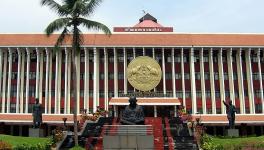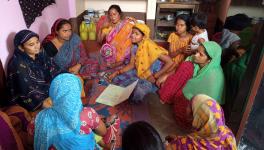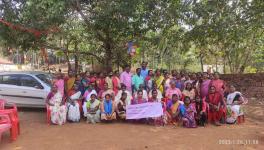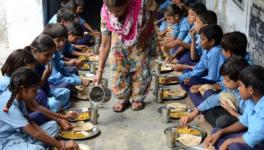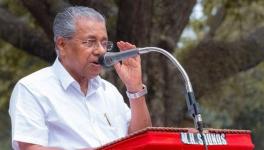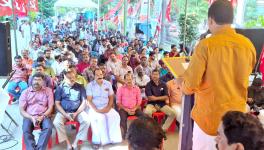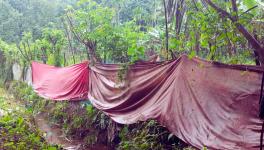Kerala Launches ‘Nutritious Childhood’ Scheme to Eradicate Malnutrition Among Children
The Chief Minister inaugurated the ‘Poshaka Balyam’ program by offering milk and eggs to children in the Anganwadis. (Courtesy: Twitter/Kerala Government)
The government of Kerala has launched an exclusive program, ‘Poshaka Balyam’ (Nutritious Childhood) on August 2 to improve nutrition among children in the age group of 3-6. The Anganwadi and pre-school-going children will be provided with eggs and milk twice every week. Kerala is the first state to implement such a program in the country to counter undernutrition among children.
This crucial intervention from the health and family welfare department along with the local self-governance (LSG) department is set to reach out to around 4 lakh children attending 33,115 Anganwadis in the state.
The state-owned MILMA of the Kerala Co-operative Milk Marketing Federation (KCMMF) and Kudumbashree, the women self-help groups (SHG) network are roped in to supply milk and eggs to the children.
Though UNICEF ranked Kerala 2nd among the Indian states in the percentage of children aged 6–23 months receiving a minimum acceptable diet, the government is concentrating to eliminate malnutrition and stunted growth among children.
The state has continuously rolled out programs to improve the physical, mental and intellectual well-being of children.
CRUCIAL INTERVENTIONS FOR CHILD WELFARE
The Left Democratic Front (LDF) government has initiated the ‘Poshaka Balyam’ to eradicate malnutrition among children between 3 to 6 years. The department of women and child development (WCD) will oversee the implementation of the programme.
“The government is committed to ensuring the improvement of physical, mental and intellectual well-being of the children. This scheme to provide milk and eggs twice a week is aimed towards achieving the same,” said Veena George, the health minister, during the inauguration of the scheme.
The government has sanctioned Rs 61.5 crores for the implementation of the scheme. The UNICEF study on comprehensive national nutrition survey (CNNS) 2016-18 estimated that only 6.4% of children across the country and within the 6-23 months age group receive a minimum acceptable diet.
“As per the CNNS of UNICEF, Kerala is ranked second in the country with 32.6% of children receiving a minimum acceptable diet. The LDF government aims to enhance it further and ensure better nutrition,” said PInarayi Vijayan, the chief minister in his address while inaugurating the program.
The MILMA has been instructed to provide milk at no loss, no profit method, while the poultry farms run by the Kudumbashree organisation has been entrusted with the task of supplying eggs.
MORE EMPHASIS ON CHILD NUTRITION
The government has been implementing several programs to increase nutritious food supply to children ever since a National Family Health Survey (NFHS) found children suffering from malnutrition and stunted growth.
The percentage of students increased in Kerala during 2019-20 compared to that of 2015-16. Kerala stood among the top five in lower malnutrition and stunted growth, but the government is inclined to eradicate the issues affecting children.
“In addition to the Amrutham Nutrimix provided to the children attending the Anganwadis under the ‘take home ration’, the LDF government is implementing this scheme to provide additional nutritious food. There are six different schemes implemented by the ICDS through the Anganwadis for the benefit of children, pregnant women and lactating mothers to improve their nutrition,” Veena George said.
The chief minister hinted at extending the scheme to a higher number of days, and instructed the LSG and Anganwadis to explore options in their capacity.
“This is just the first step initiated by the government with options open to increasing the number of days. But the concerned implementing bodies can try to explore possibilities,” he said.
In addition to the six services, of which five are for children below six years and one for women aged between 15 and 35 provided by the WCD department, the government has also rolled out a 1000 days service between a woman’s pregnancy (270 days) and the second birthday of the child. The scheme is implemented to follow up with the child and mother
“Childhood is crucial to lay the foundation for a healthy future. The government is paying special attention to child welfare and protection. The benefits are extended to all households irrespective of their economic background. Every child in the state must be healthy and nutritious, which is a goal set by the government,” Vijayan said.
Get the latest reports & analysis with people's perspective on Protests, movements & deep analytical videos, discussions of the current affairs in your Telegram app. Subscribe to NewsClick's Telegram channel & get Real-Time updates on stories, as they get published on our website.









